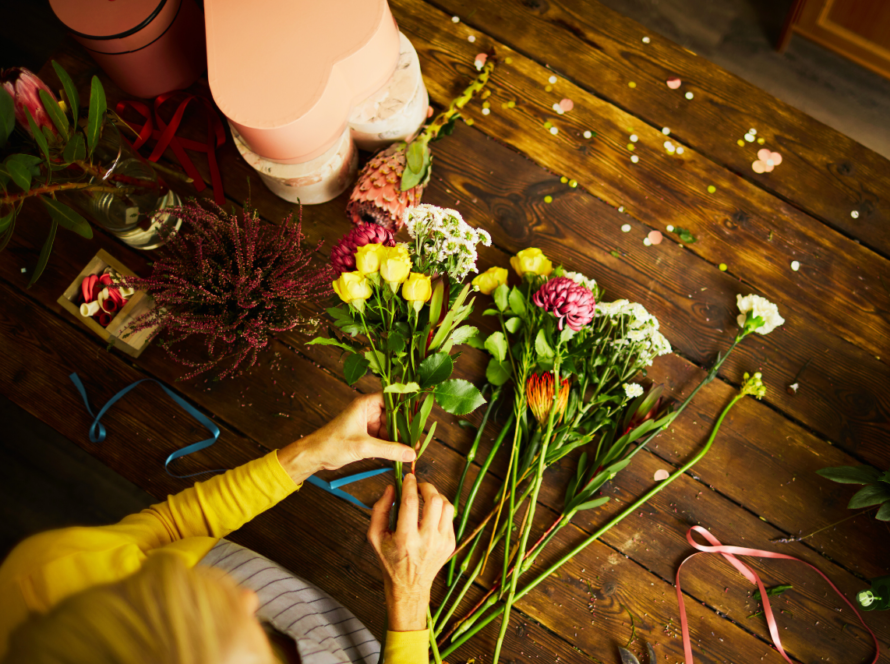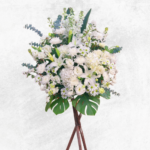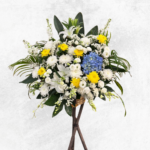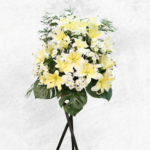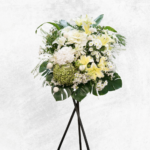Wedding flowers are a cornerstone of any celebration, adding beauty, fragrance, and a touch of romance to your special day. From the bridal bouquet to centerpieces and ceremony decor, the right blooms can transform your vision into a breathtaking reality. This guide is designed to help you navigate the world of wedding flowers, offering insights into choosing the perfect blooms, understanding seasonal availability, and creating stunning arrangements that reflect your unique style and budget.
Wedding Flower Essentials: What to Consider
Before diving into the world of blooms, it’s crucial to consider a few key factors that will influence your floral choices. Here’s what you need to think about:
- Budget: Set a realistic budget for your wedding flowers and be open to exploring different options to stay within your range. Some flowers are more expensive than others, so consider the seasonality and availability of your desired blooms.
- Venue and Style: The style of your wedding venue and the overall aesthetic you envision will impact your flower choices. For example, a rustic barn wedding might call for wildflowers and greenery, while a formal ballroom wedding may demand elegant roses and orchids.
- Time of Year: Wedding flowers are often tied to the season, which can influence both the availability and cost of certain blooms. Spring offers a vibrant palette of tulips and peonies, while fall brings warm hues of dahlias and sunflowers.
- Personal Preferences: This is your day, so prioritize your favorite flowers! Don’t be afraid to request unique blooms or incorporate elements that reflect your personality and style.
- Color Palette: Choose a color palette that complements your wedding theme and dress. Consider the seasonality of your wedding and the colors that will be most vibrant during that time.
- Scent: If you’re sensitive to strong scents, consider choosing flowers with a lighter fragrance or opting for non-floral alternatives like greenery and branches.
By addressing these essential factors upfront, you can streamline your flower selection process and ensure a cohesive and stunning floral experience for your wedding.
Choosing Your Wedding Flower Palette
Once you’ve considered the essential factors, it’s time to dive into the fun part: choosing your wedding flower palette! This is where your personality and vision truly shine. Here are some tips to help you create a color scheme that’s both beautiful and meaningful:
- Start with your wedding theme: If you have a specific theme, such as rustic, bohemian, or classic, you can use this as a starting point for your flower choices. Rustic themes often incorporate earthy tones like burgundy, terracotta, and cream, while bohemian styles might include bold colors like coral, turquoise, and gold. Classic weddings tend to lean towards traditional colors like white, ivory, and blush.
- Consider the season: Seasonal blooms are often more affordable and vibrant, offering a fresh, natural feel to your wedding. Spring brings pastel hues and delicate blossoms, summer offers bold, vibrant colors, autumn boasts warm, rich tones, and winter features elegant whites and blues.
- Choose a color story: Select a main color and two or three complementary colors to create a harmonious palette. You can play with shades and tones of each color to add depth and dimension. Don’t be afraid to experiment with contrasting colors or textures, as long as they complement each other.
- Look at inspiration: Browse magazines, wedding websites, and Pinterest for inspiration and gather ideas that appeal to your style. Collect images of floral arrangements you love and analyze the color combinations.
- Incorporate your personal touches: Choose flowers that hold special significance to you, whether it’s your favorite bloom or a flower that represents your love story. These personal touches will make your wedding truly unique.
Wedding Flower Styles: Trends & Inspiration
Beyond the basic blooms, the world of wedding flowers offers a captivating array of styles to bring your vision to life. From classic and romantic to modern and minimalist, there’s a style to complement every wedding theme.
Classic Romance
Timeless and elegant, classic romantic wedding flowers embrace a soft, ethereal aesthetic. Think of cascading bouquets of roses, peonies, and hydrangea in pastel hues of blush, ivory, and lavender. This style often features lush greenery, like eucalyptus and ivy, to create a dreamy, fairytale-like atmosphere.
Modern Minimalism
For a contemporary touch, modern minimalist wedding flowers prioritize clean lines and simple arrangements. Succulents, tulips, and orchids in bold colors like black, white, or jewel tones are popular choices. Arrangements are often geometric or asymmetrical, focusing on texture and form over abundance.
Rustic Charm
Embracing natural beauty, rustic wedding flowers incorporate elements of the outdoors. Wildflowers, dahlias, and grasses are key players, often arranged in loose, informal bouquets. Burlap, wood, and mason jars can add to the earthy charm of this style.
Tropical Paradise
Transport your guests to a lush paradise with tropical wedding flowers. Birds of paradise, hibiscus, anthurium, and banana leaves create vibrant, colorful arrangements. Tropical flowers are best suited for warm climates, adding a touch of exotic flair to your wedding celebration.
| Style | Description | Popular Flowers | Additional Elements |
|---|---|---|---|
| Classic Romance | Timeless and elegant, embracing a soft, ethereal aesthetic. | Roses, peonies, hydrangea | Eucalyptus, ivy |
| Modern Minimalism | Prioritizes clean lines and simple arrangements with a contemporary touch. | Succulents, tulips, orchids | Geometric or asymmetrical arrangements, focusing on texture and form |
| Rustic Charm | Embraces natural beauty, incorporating elements of the outdoors. | Wildflowers, dahlias, grasses | Burlap, wood, mason jars |
| Tropical Paradise | Creates vibrant, colorful arrangements, transporting guests to a lush paradise. | Birds of paradise, hibiscus, anthurium, banana leaves | Best suited for warm climates, adding an exotic flair |
Arranging Your Wedding Flowers: From Bouquet to Ceremony
Once you’ve chosen your flowers, it’s time to start thinking about how you want to arrange them. This is where your creativity can really shine! From the traditional bridal bouquet to the elaborate centerpieces, there are endless possibilities for incorporating flowers into your wedding décor.
Key Wedding Floral Arrangements:
- Bridal Bouquet: This is the centerpiece of your floral display, and it should complement your wedding dress and overall style. Consider different bouquet shapes, like a cascading bouquet, a round bouquet, or a hand-tied bouquet.
- Bridesmaids’ Bouquets: These bouquets should coordinate with the bridal bouquet, but can be slightly smaller or feature different flowers.
- Groom’s Boutonniere: This small arrangement is pinned to the groom’s lapel and traditionally matches the bride’s bouquet.
- Ceremony Flowers: Decorate your ceremony space with floral arrangements that create a beautiful backdrop for your vows. Think about using floral arches, pew decorations, or a stunning altar arrangement.
- Reception Centerpieces: These arrangements set the tone for your reception, and can range from simple and elegant to bold and dramatic. Consider the size and shape of your tables and the height of the centerpieces to ensure guests can see each other.
When arranging your flowers, it’s important to consider the overall flow and balance of your décor. Choose arrangements that complement each other in size, shape, and color. Don’t be afraid to experiment with different textures and heights to create visual interest.
Wedding Flowers Conclusion
From selecting the perfect blooms to arranging them in breathtaking displays, wedding flowers play a pivotal role in creating a truly unforgettable celebration. This comprehensive guide has explored essential considerations, from budget and venue style to seasonal availability and personal preferences. We’ve delved into the world of wedding flower palettes, discovering how to create harmonious color schemes that reflect your unique style and vision.
With inspiration from classic romance to modern minimalism, rustic charm to tropical paradise, we’ve journeyed through diverse wedding flower styles, uncovering the beauty and versatility of floral arrangements. We’ve also explored key wedding floral arrangements, from the bridal bouquet to ceremony décor and reception centerpieces, providing insights into creating balanced and visually captivating displays.
As you embark on your wedding planning journey, remember that wedding flowers are more than just decorations; they are an expression of your love story, a reflection of your personality, and a celebration of your commitment. Embrace the beauty and artistry of wedding flowers, and let them transform your vision into a breathtaking reality.
Wedding Flowers Quick FAQ
How far in advance should I book my wedding florist?
It’s recommended to book your wedding florist 12-18 months in advance, especially if you have a specific date or flowers in mind. Popular florists often book up quickly, so securing your florist early will help ensure they’re available for your special day.
What are some budget-friendly alternatives to expensive flowers?
There are many affordable options for wedding flowers! Consider using seasonal blooms, incorporating greenery and branches, opting for smaller bouquets, or choosing less expensive varieties like carnations, lilies, and hydrangeas. You can also explore DIY options like creating your own centerpieces or using non-floral elements like candles, lanterns, and fabric.
What if I’m having an outdoor wedding and it rains?
Many florists offer backup plans for outdoor weddings in case of rain, such as moving arrangements indoors or using weather-resistant flowers and greenery. It’s always a good idea to discuss your contingency plan with your florist during the planning process.


